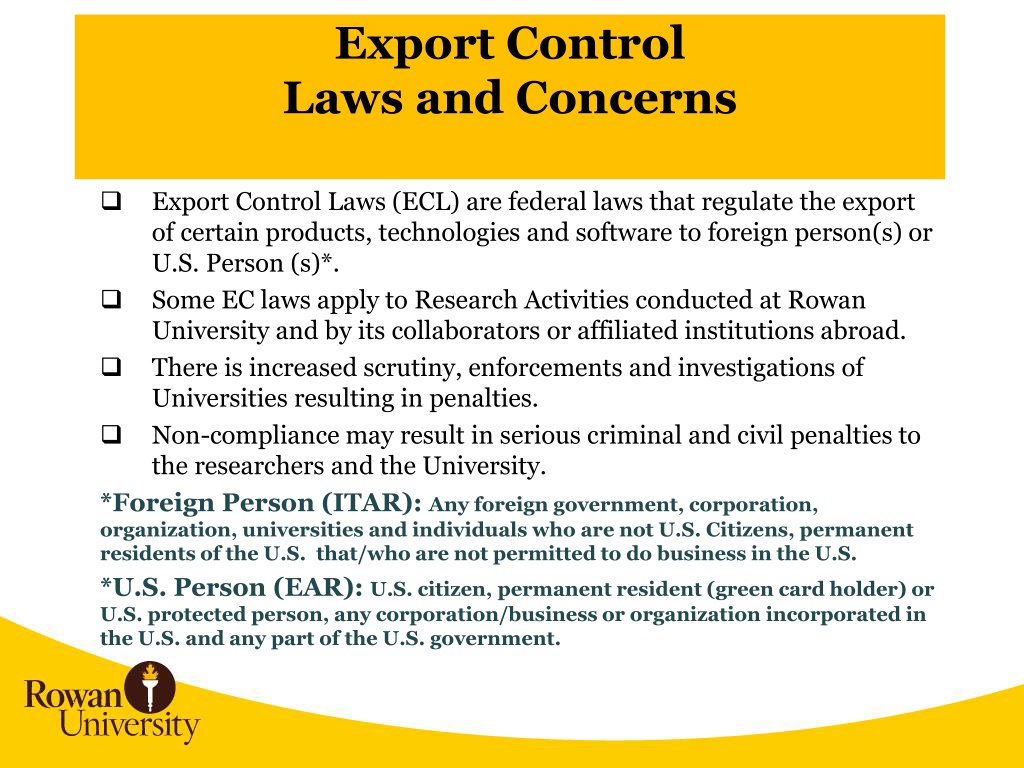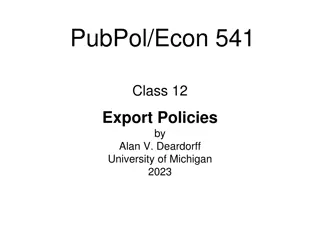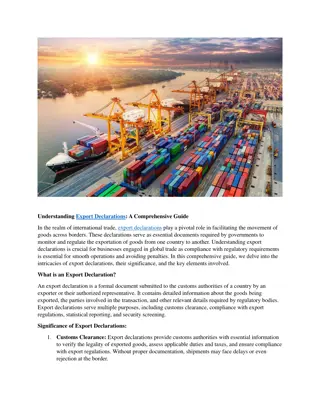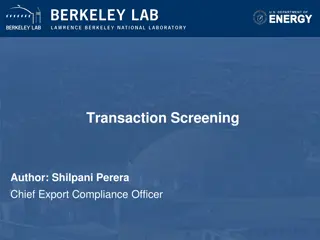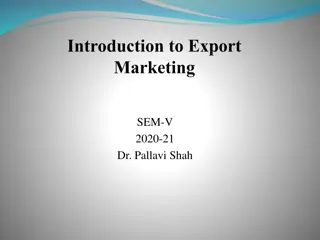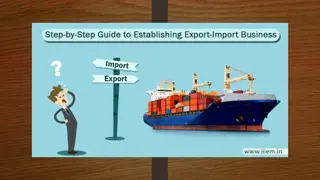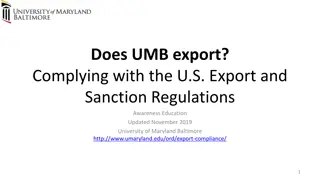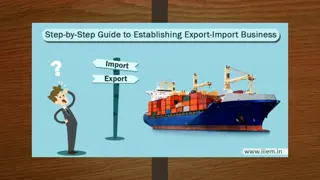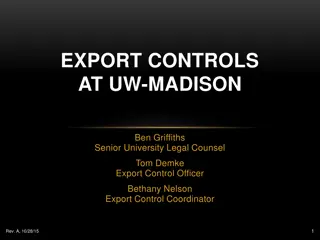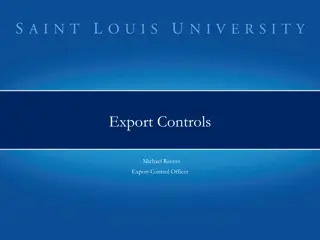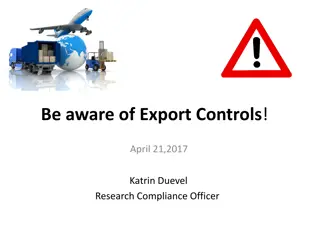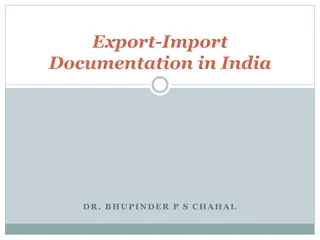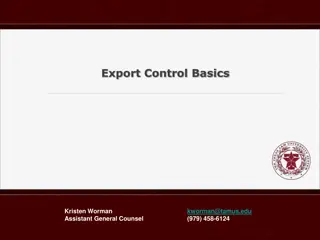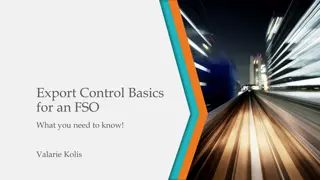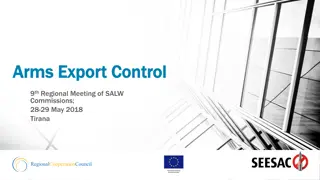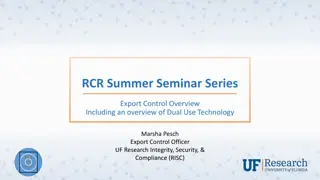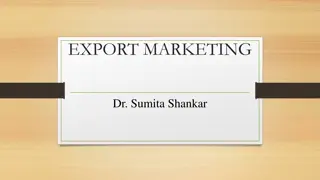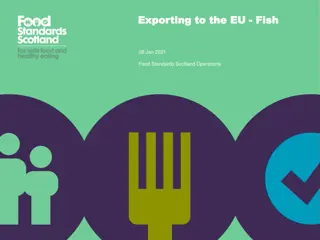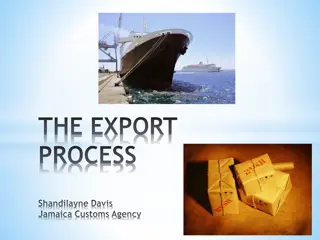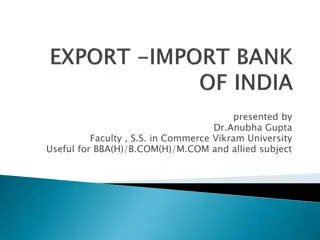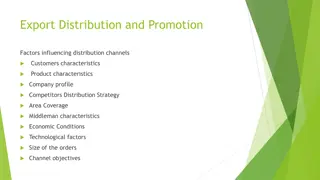Understanding Export Control Laws and Compliance Concerns
Federal Export Control Laws (ECL) regulate the export of sensitive products, technologies, and software to foreign entities. Non-compliance can lead to severe penalties for researchers and institutions. ECL aims to promote national security, prevent terrorism, and comply with international commitments. Three key regulatory authorities oversee ECL enforcement: the Commerce Department, State Department, and Treasury Department.
Download Presentation

Please find below an Image/Link to download the presentation.
The content on the website is provided AS IS for your information and personal use only. It may not be sold, licensed, or shared on other websites without obtaining consent from the author. Download presentation by click this link. If you encounter any issues during the download, it is possible that the publisher has removed the file from their server.
E N D
Presentation Transcript
Export Control Laws and Concerns Export Control Laws (ECL) are federal laws that regulate the export of certain products, technologies and software to foreign person(s) or U.S. Person (s)*. Some EC laws apply to Research Activities conducted at Rowan University and by its collaborators or affiliated institutions abroad. There is increased scrutiny, enforcements and investigations of Universities resulting in penalties. Non-compliance may result in serious criminal and civil penalties to the researchers and the University. *Foreign Person (ITAR): Any foreign government, corporation, organization, universities and individuals who are not U.S. Citizens, permanent residents of the U.S. that/who are not permitted to do business in the U.S. *U.S. Person (EAR): U.S. citizen, permanent resident (green card holder) or U.S. protected person, any corporation/business or organization incorporated in the U.S. and any part of the U.S. government.
Intent of ECL Restricts export of sensitive equipment, software and technology - to promote U.S. national security interests and foreign policy objectives. Through ECL, U.S. govt. can effectively: Advance national security by limiting access to the most sensitive U.S. technology and weapons; Promote regional stability; Take into account human rights considerations; Prevent terrorism; Prevent proliferation of weapons and technologies, including of weapons of mass destruction, to problem end-users and supporters of international terrorism and Comply with international commitments, i.e. nonproliferation regimes and UN Security Council sanctions and UNSC resolution 1540.
Export Control Regulatory authorities Three Federal agencies Commerce Department Dual Use Technologies Primarily civil and some military issues Export Administration Regulations (EAR) State Department Fundamentally military technologies controlled by International Traffic and Arms Regulation (ITAR) Treasury Department Office of Foreign Assets Control (OFAC) - Forbids any form of transactions with embargoed countries (boycotts and trade sanctions)
Export Control Definition Export-Controlled means that activities, items, information, technology, and software related to the design, development, engineering, manufacture, production, assembly, testing, repair, maintenance, operation, modification, demilitarization, processing, or use of a controlled item requires an export license, or license exception, to physically export from the U.S. OR to discuss with or disclose to a person who is not a U.S. citizen or lawful permanent U.S. resident. Export Controlled Items: Those that are listed in the US Munitions List (ITAR 20 categories, the Commerce Control List (CCL nine categories) and controlled pathogen/toxins (ECCNs 1C351-1C360) or chemicals (chemical agent precursors, propellants, explosives and energetic materials).
Definitions: Export, Deemed Export and Re-Export Export Transfer or transmission of controlled technology or information, shipment of equipment, information, software and services to a foreign person or entity in the U.S. or abroad. This includes: Actual, visual disclosure, electronic, written or oral disclosure of information Deemed Export (Exporting without crossing borders) It is the release to a foreign national in the U.S., of technology or a source code that is subject to export control regulations (EAR) Re-export Transmission or Shipment, release technology or items regulated by ECL from one foreign country to another foreign country
What is not Export Controlled 1. Basic marketing information on function or purpose. 2. Information concerning general scientific, mathematical, or engineering principles commonly taught in schools, colleges and universities. 3. Information developed and published without any restriction as a result of fundamental research in science and engineering at accredited institutions of higher learning in the U.S. 4. Published information in the public domain; and published patent.
Export Control Unclassified and Classified Research Classified Work conducted under the specific designation as Classified by the Federal funding sponsor or other governmental agency. RU policy is: classified research requiring secrecy may not be conducted on the campus. (https://confluence.rowan.edu/display/POLICY/Openness+in+Resea rch+Policy.). Unclassified The basic policies of RU include complete freedom of research and unrestricted dissemination of information (https://confluence.rowan.edu/display/POLICY/Export+Control+Pro gram.).
Impact of ECL on Rowan Faculty Able to conduct research under Fundamental Research Exclusion (FRE). Freedom to publish is mandatory without restrictions when work is done within RU campuses. Able to ship certain items that are designated as EAR99 Not on Commerce Control List (CCL) or not containing certain Export Control Commerce Number (ECCN). Low technology goods. Do not require licensing. Cannot be shipped to embargoed countries, end-user of concern or prohibited end-use. Requires classification and licensing.
Impact of ECL on Students Undergraduates Academic courses are exempt from ECL. Travelling on NSF or other funds to attend a conference must follow RU international travel policy. Travel abroad as part of curriculum is exempt from ECL. Graduate students from foreign countries may be able to: Conduct research with controlled technology; Share certain materials with foreign nationals except items such as technology or software (check with Rowan ECO); and Ship certain equipment (License determination required).
Fundamental Research Exclusion - Definition Basic and applied research in science and engineering, the results of which are ordinarily published and shared broadly within the scientific community. Includes the following: Books, newspapers, pamphlets Publically available technology and software Information presented at conferences, meetings, and seminars open to the public Information included in published patents Websites freely accessible by the public Does not include proprietary research or industrial development, design, production and product utilization that are restricted for the purpose of national security.
Fundamental Research Exclusion (FRE) Case Scenario Dr. Smith, a professor in Material Sciences, submits a proposal to NSF and receives a basic science research grant. The grant document indicates the standard NSF terms and conditions. He hopes that the results obtained from this grant will be featured in many prominent scientific journals. Does this scenario fall under FRE? Why? Intend to publish? Any restrictions on foreign nationals? Are there any restrictions for national security purposes?
Dos and Donts in EC Do conduct an export control analysis before starting a project. Do a thorough review background technology. Do identify the technology to be developed. Do assess what equipment, materials or software are needed to develop a technology. Do determine who the end-user is and purpose of end-use. Do determine whether foreign persons or foreign country is involved (technology, software, traveling, shipping and collaboration).
Dos and Donts in EC Technical Data Exchange Do make sure that technical data about export controlled items qualify as "public domain" (ITAR term - International Traffic in Arms Regulations, State Department) or "publicly available" (EAR term Export Administration Regulations, Commerce Department), by any of the following means: Published information: in journals, books, open websites, or other media available to a community of persons interested in the subject; readily available at university libraries (EAR 734, Supplement 1, Questions A (1) A (6)). Published through release at open conferences and meetings. Educational information released by instruction in catalog courses and associated teaching laboratories of the University. Fundamental research where the resulting information is ordinarily published and shared broadly within the scientific community and where no contractual controls have been accepted.
Dos and Donts in EC Technical Data Exchange Do review any Confidentiality/Non-Disclosure Agreements to ensure that Rowan University and you are not assuming the burden of restricting dissemination based on citizenship status or securing export licenses. Do, whenever possible, make University created software "publicly available. Do "publish" software and technical data, that is, make it available for general distribution either for free or at a price that does not exceed the cost of reproduction and distribution. Do ask the software provider to identify the ECCN number that controls the software. If the source code of a software program is publicly available, it is not subject to ECL.
Dos and Donts in EC Do Check first Export Control Regulations of ITAR (International Traffic in Arms Regulations, State Department) and EAR (Export Administration Regulations, Commerce Department) lists to determine if the item (including a commodity, software or technology) is controlled. Do Contact Office of Research Compliance (ORC-ECO) They will help you with Classifying items and how classification was determined (required) Securing license Verifying license exception (EAR99 has a list of items under license exception) Do train your research staff regarding shipping of a commodity, software of technology. ECO at RU is available for training your staff. Do identify projects with deliverable to foreign countries at the proposal or award stage so that the SPO can prepare for action when the project is funded. Do work closely with RU ECO early at proposal or award stage to determine whether a license is required to ship an item securing license could be a lengthy process.
Dos and Donts in EC Software Do not agree to software license restrictions on access to, or use of, the software by nationals of certain countries, particularly those from Countries that are sanctioned by the U.S. Govt. (Cuba, North Korea, Iran and Crimea region of Ukraine) Do not enter into proprietary data agreements where the commercial entity includes an export control notice, or restricts dissemination to others on the basis of nationality or citizenship. Do not sign the DD2345, Militarily Critical Technical Data Agreement, as a condition of attending a conference or receiving materials from the government. Do not accept data from a commercial contractor that is marked "export controlled.
International Shipment Complete RU s International Shipment form This form is intended to evaluate: Prohibited end use having reasons to believe that the item may support: The design, development, production, stockpiling or use of a nuclear explosive device, chemical or biological weapons, rockets/missiles, or space launch vehicles. Material have any military, intelligence, space or nuclear applications. Information or software developed under a sponsored agreement imposing publication restrictions or barring foreign national participation Did an external sponsor, vendor, collaborator or other third party provide the item, information or software to be shipped under a Non-Disclosure Agreement (NDA) or a Confidentiality Agreement? Shipping Destinations Shipping to embargoed countries If Yes to shipping, contact RU s ECO. ECO will assist in conducting Restricted Party Screening (RPS) Assist in determining export control classification to secure license, if required Plan ahead, may take 6 8 weeks to secure license)
International Travel To travel abroad, complete RU s International Travel Form Be familiar with RU s Policy on International Travel and Collaboration Guidelines (https://sites.rowan.edu/officeofresearch/compliance/exportcontro ls/internationaltravel/index.html). This form requests the following information: Travel purpose Sharing items, technology, software that are NOT publicly available or in the public domain or developed for presentation or publication in a public forum or conference. Organizations and person you will visit or interact with. Hand carrying any equipment or chemical or biological agents. Travelling to or passing through embargoed countries. Traveling with institution-owned equipment (Temporary Export TMP) Must be returned within one year of when they leave. Must be under effective control. ECO will provide a certification to the traveler, if necessary.
Visiting International Scholars and Researchers To bring international scholars and Researchers to RU, follow RU s Policy on Export Control Guidelines for Visiting Professors and Research Scholars (https://confluence.rowan.edu/display/POLICY/Export+Control+Gu idelines+for+Visiting+Professors+and+Research+Scholars) Visiting Scholar (VS) or Researcher (VR) must submit Visiting Scholar/Researcher Information and Export Control Form before arriving at RU. https://sites.rowan.edu/officeofresearch/compliance/exportcontrols/ formschecklists/index.html. When VS/VR arrives at RU, must meet with ECO VS/VR and the Department Chair will sign EXPORT CONTROL ACKNOWLEGDGEMENT FOR ALL FOREGIN NATIONALS VISITING ROWAN UNIVERSITY .
Restricted Party Screening (RPS) To comply with ECL, RU reserves the rights to conduct RPS (also called denied party list) to confirm, document and ensure that the person or entity with whom RU faculty, staff and graduate students interacting or shipping materials is not in the restricted party list. This includes: VS/VR, Foreign nationals, and their national organization and Recipient of any item, service, information and commodity who is a non-U.S. person, foreign national or a foreign country and end- user. Ensuring that information, items and software do not end in the hands of any individual or company or entity on the RPS.
Technology Control Plan (TCP) A TCP is a document that formalizes the procedures that RU will use to control access to and release of export controlled items, information, materials, etc. in accordance with ECL. It is a mechanism for documenting that research personnel are aware of their compliance responsibilities. A TCP is used when: A project or activity involves the receipt of Sensitive Unclassified Information (SUI) from an outside party or sponsor under a nondisclosure agreement or sponsored research agreement. Projects or activities are not considered Fundamental Research; or Projects or activities involve technology and software associated with export-controlled equipment. Elements of TCP A statement of institutional commitment to complying with applicable regulations; Commodity Jurisdiction (which agency has authority) and classification (what type of item/information is involved); A description of physical security measures; A description of information security measures; Personnel requirements; and Administrative elements (i.e., inspections, training, recordkeeping, etc.)
Technology Commercialization ECL Concerns FRE no publication restrictions Technology may already has been published, outside the scope of publication. Publication of patent application General guidance do not publish (35 U.S.C 122(b). Reason: Publication may motivate potential competitors to accelerate their development of a competing technology and adversely affect a go-to market strategy for the IP-based technology.
How to Respond to Cayuse Export Control Question Check Yes if answer to any of the questions in the following checklist: https://www.slideserve.com/hedy/export- compliance. This list includes when research involves the following: Restricted science Use of defense articles (services, missiles biological weapons, nuclear technology, biohazardous select agents, high performance computing and encryption technology) Controlled items and technology Transfer or shipping information, materials, equipment or providing financial support Research conducted outside U.S., field work International travel to attend international conferences Outside U.S. research collaborations, foreign research scholars and scientists (VS/VR), graduate students, post-doctoral fellows* *If a research project is still in the proposal state and if the status of proposed graduate students, post-doctoral fellows or VS/VR is NOT known, do not check Yes until the hiring process has started.
Summary Please perform a careful review of such data, items or software before developing or accepting it. Even though the conduct, products, and results of fundamental research may proceed openly and be shared freely with foreign nationals in the United States without concern for deemed export restrictions: Remember the equipment or the item you share with your collaborator is itself export controlled; therefore, export control requirements may have to be met. Check with ECO before sharing information or equipment with foreign nationals conducting research in U.S. Before traveling or shipping items abroad. Please review University Policies regarding publication on research results and restrictions on citizenship (https://immigration-law.freeadvice.com/immigration- law/citizenship/naturalization_requirements.htm.)
Export Control Partners SPA Purchasing IRT Legal Tech Transfer EC Team Faculty Staff Audit International Program E.C. officer
